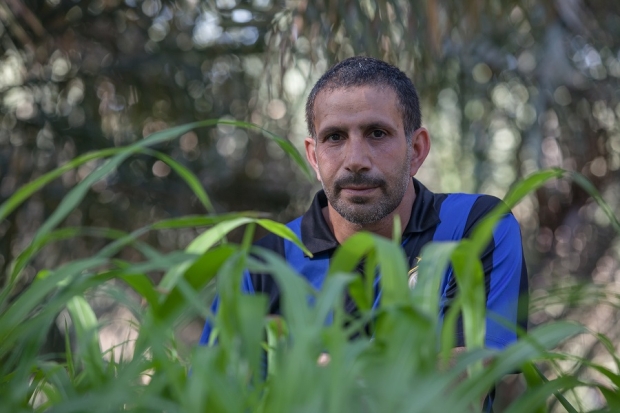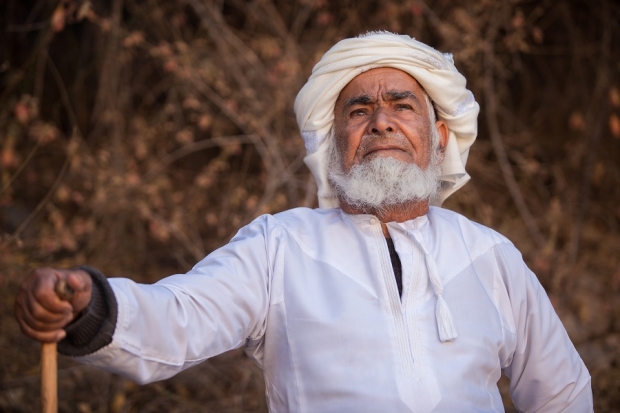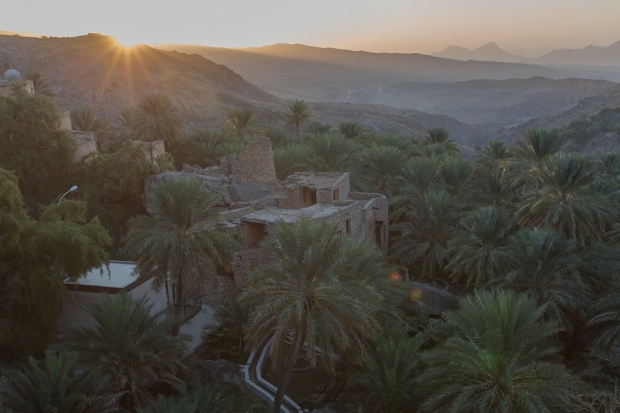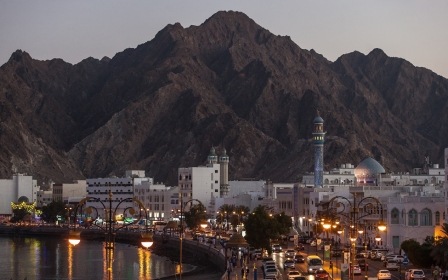Oman's Aflaj: Ancient irrigation system drying out
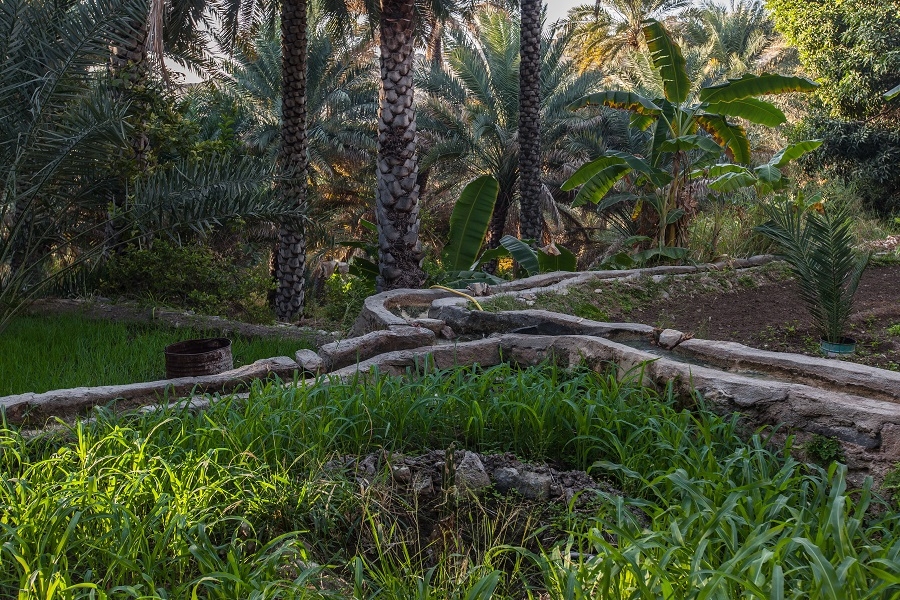
MISFAT AL-ARBIYEEN, Oman - In the dry heights of the Ad-Dakhiliyah region, not far from Nizwa, the old capital of Oman, fresh water runs through traditional streams. Archaeological evidence suggests they were carved out around 2500 BC, in order to irrigate mountainous farmlands.
'Before me, my father and my grandfather also worked on this land'
-Maleek Khaled al-Abri, farmer
Maleek Khaled al-Abri, 40, is working hard on the land where he grows palm, banana and lemon trees. With his back bent forward, his hands are busy in the dirt as water flows by his feet and feeds his small plot of land.
"Before me, my father and my grandfather also worked on this land. My children study and come to help on the weekends, but I do not think that they will perpetuate the tradition," Abri told MEE.
New MEE newsletter: Jerusalem Dispatch
Sign up to get the latest insights and analysis on Israel-Palestine, alongside Turkey Unpacked and other MEE newsletters
Water is a precious resource in Oman, which is dry and hot throughout the year. To manage the supply of water, Omani farmers created the aflaj irrigation system.
By using gravity, the system channels water from underground water sources in the mountains. The water then flows through the village’s farms to irrigate the land, often over many kilometres. The precious resource is also used for drinking and domestic work.
'More than 30 percent of the total number of aflaj are dried up now'
- Abdullah al-Ghafri, director of the Aflaj Research Unit at Nizwa University
Following a strict schedule, old rags that are held down by stones called sarjra are used to open and close the irrigation channels.
But the aflaj are increasingly drying up due to the excessive pumping of groundwater, the shrinking of agricultural land as more resorts and hotels stand tall in the area, and younger generations prefer to move to the city in search of work. Less and less children are following in their fathers’ paths and tending to the aflaj and the farms.
"More than 30 percent of the total number of aflaj are dried up now,” Abdullah al-Ghafri, director of the Aflaj Research Unit at Nizwa University, told MEE.
“New generations do not have the interest to learn traditional techniques. Urbanisation is another major threat, as the share of land used for agriculture is shrinking," he added.
Many local tribesmen who had managed the aflaj have already passed away, taking with them the secrets of the trade.
"The main problem is the loss of the people with experience; many old people whose expertise passed away with them before we documented their knowledge,” Ghafri said.
'Before it was full of farmers and well-kept plantations. Now, with hotels, tourism, and companies in the cities, not many people still make a living in the farms'
- Suleiman bin Brek Riyami, wakil
In 2006, UNESCO recognised five aflaj as world heritage sites. Aflaj, is the plural of falaj, which in Arabic means to divide into shares.
For centuries, the irrigation time for each farm was calculated by using the sun and the stars.
Zahor bin Suleiman, 48, is a farmer and owner of a plot of land in the village of Misfat al-Abriyeen, near Nizwa city. He remembers how his father always knew it was time to irrigate his land, half a century ago.
"At night, when a star aligned with our heap of rocks, we had the right to irrigate until the time when the star was no longer aligned," Suleiman said as he pointed to a heap of stones piled on a distant hill.
Wakil, judge of water
Watches, which were expensive in Oman at that time, were only given to wakils, Omani judges in charge of the overall administration of the Aflaj.
They are "in charge of the distribution of water, water fees, budgeting for the aflaj, solving water-related conflicts between farmers, emergencies, and other decisions related to the aflaj," Ghafri explained.
Not far from the Antara Jabal al-Akhdar resort and its luxurious hotels that cater to tourists, Suleiman bin Brek Riyami, 70, stands in an old, crumbling village.
Being a wakil for more than 40 years, he wears the traditional white dishdasha and moves with agility between the dried up aflaj.
He explained that timeshares for irrigation were sold to families starting from half-an-hour a day. According to Riyami, a farmer could purchase upfront the right for a lifetime of irrigation for a fee of 1500 Omani Riyals (US$3,900). This would give him one hour of water for 10 days a month, every year.
'The aflaj system is more than a simple structure of irrigation, it provides stability, justice and equality in the community'
- Abdullah al-Ghafri, Director of the Aflaj Research Unit at Nizwa University
In case of drought, additional hours could be arranged and farmers who did not use up their share of water could then sell it. The aflaj system was sustained by the people without any interference from the government for centuries.
"In case of conflicts, either the wakil or the owners can complain to the sheikh [community leader]. If the sheikh could not solve the problem, then the wakil or the owners would call for an audit committee to check the income and outcome of the aflaj cash flow. This committee normally consists of three or four trustees from the village," Ghafri said.
The financial benefits of the aflaj system are often invested into the community, to maintain village mosques and schools and help poor families and orphans.
According to Ghafri, the aflaj system is more than a simple structure of irrigation - it provides stability, justice, and equality in the community. The government has been exerting efforts to issue legislation to protect the remaining aflaj that farmers depend on and raise awarenesss regarding its importance.
Threats to the tradition
"Before it was full of farmers and well-kept plantations. Now, with hotels, tourism, and companies in the cities, not many people still make a living in the farms. It is sad, because we could always get a good income from the plantations," said Riyami, looking wistfully at the abandoned lands and aflaj that are filled with dead leaves.
Wakils and farmers do not see their children following in their footsteps and learning the traditional trade.
This also goes for Abri ’s son, who is studying at Sultan Qaboos University in the capital Muscat and sees his future there.
"I learnt the job from my father and my grandfather, but my son and grandson will do something else. This tradition could disappear," Abri said, sighing.
Middle East Eye delivers independent and unrivalled coverage and analysis of the Middle East, North Africa and beyond. To learn more about republishing this content and the associated fees, please fill out this form. More about MEE can be found here.


